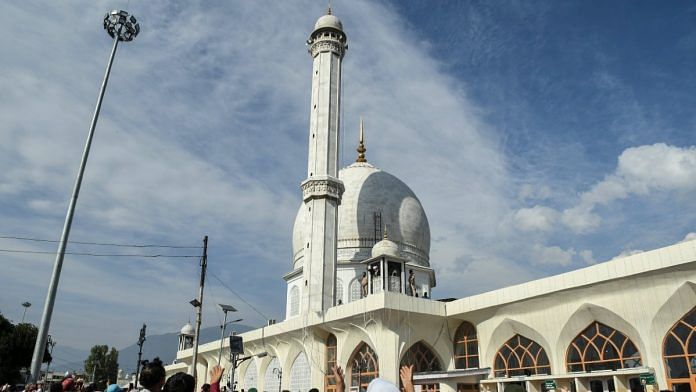New Delhi: The inauguration of the Hazratbal shrine development project by Prime Minister Narendra Modi is a “positive development”, an Afghan diplomat told ThePrint, while experts termed the move as strategic outreach aimed not only at Indian Muslims but also the Arab world.
Situated along the Dal Lake, Hazratbal is a revered site for Muslims since it is believed to house a hair from the beard of Prophet Mohammad.
On Thursday, Modi visited Kashmir for the first time since the abrogation of Article 370 in August 2019.
Inauguration of the Hazratbal shrine development project, part of an ambitious plan to boost tourism and infrastructure in the valley, also comes at a time when the general election is nearing.
Speaking to ThePrint, Afghan Consul General (Hyderabad) Syed Mohammad Ibrahimkhail — currently viewed as de-facto head of the Afghan embassy in Delhi — termed the project a “positive development” that he said would be appreciated by the people of Afghanistan.
“This is an ancient mosque. It is very important in the Islamic faith. The people of Afghanistan appreciate PM Modi’s efforts to preserve and develop it. This is no doubt a positive development,” he said.
Meanwhile, representatives of other countries that comprise the Arab world, including Iran and Egypt, declined to comment, terming it an “internal matter”. The UAE Embassy in Delhi too refused to comment.
In August 2019, when the Modi government scrapped the special status of Jammu and Kashmir, the foreign ministers of Saudi Arabia and the UAE had travelled to Pakistan in a show of solidarity with Islamabad, but stopped short of condemning the move by India. Saudi Arabia had expressed concern while the UAE called it an “internal matter”.
The UAE also bestowed on Modi the country’s highest civilian award – the Order of Zayed – three weeks after the abrogation in August 2019.
“When Modi scrapped special status in Kashmir, there was a muted response from Muslim nations, apart from Pakistan,” Veeramalla Anjaiah, a senior Research Fellow at Center for Southeast Asian Studies (CSEAS) in Indonesia, told ThePrint.
“By inaugurating the Hazratbal shrine, Modi has put a socio-cultural stamp on the 2019 decision. Recently, he inaugurated a mandir in Abu Dhabi. These moves could be seen as strategic. Looking back, the Nupur Sharma controversy, which sparked backlash from several nations including Indonesia, would be seen as an isolated incident from a radical member of the BJP,” he added.
In June 2022, Saudi Arabia, Iran, Qatar, Kuwait and many other Muslim nations had criticised then BJP spokesperson Nupur Sharma for making derogatory comments about Prophet Mohammed during a TV debate. Sharma was later suspended from the party.
Indonesia, home to the world’s largest Muslim population, and Malaysia had at the time summoned India’s envoys in their countries over this issue.
Also Read: India among fastest growing diplomatic networks, 11 new posts since 2021, reveals new report
‘Positive gesture to Indian Muslims & Arab world’
An ambassador from a Middle Eastern country, who did not want to be named, told ThePrint: “This could be viewed as a positive gesture both towards Indian Muslims and the Arab world.”
The Hazratbal shrine is considered one of the holiest Muslim Khanqahs.
“Khanqah” is a Persian term that refers to a place or structure for spiritual teaching and where Sufi masters would traditionally hold their assemblies.
Last month, after inaugurating the Ram temple in Ayodhya built on the site of the demolished Babri Masjid, Modi travelled to Abu Dhabi to unveil a sprawling Hindu temple there — the largest in the Gulf country thus far.
Modi’s visit to the UAE last month, as well as one-day trip to Qatar following the release of Indian naval veterans previously sentenced to death in the Gulf country, was hailed as a sign of India’s deepening ties with the Arab world.
According to Arunansh Goswami, a historian and human rights lawyer based in Delhi, Arab countries have shown more willingness to befriend India in recent years, and Modi has picked up their signal.
“The Muslim world has a chasm between the Turks and the Arabs going back to the days of Lawrence of Arabia and the Arab war for independence. While the Turks under Erdogan have shown a pro-Pakistan approach to foreign policy calling Kashmir ‘modern Çanakkale’, Arabs have shown more willingness to befriend India,” Goswami told ThePrint.
“Modi has got that signal and is building on it. Friendship between India and Arabs is beneficial for both and also a way of counteracting Erdogan’s neo-Ottomanism,” he added.
(Edited by Amrtansh Arora)
Also Read: ‘Sheikh Mohamed bin Zayed agreed to Modi’s request for Hindu temple in 5 mins,’ says UAE diplomat



